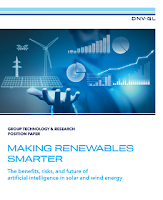The position paper “Making Renewables Smarter: The benefits, risks, and future of artificial intelligence in solar and wind” explores where artificial intelligence like machine learning will have an impact to increase efficiencies in the renewables industry. Areas include decision making and planning, condition monitoring, robotics, inspections, certifications, and supply chain optimization, but also the way technical work is carried out.
The renewables industry is a data rich environment. Wind and solar generation plants have benefited from the fact that these technologies have been commercially developed relatively recently and have had sensor technology installed from the beginning. As a result, most of the advances supported by artificial intelligence have been in resource forecasting, control, and predictive maintenance. DNV GL's paper outlines how these AI advances are likely to progress further.
...
Solar and wind industry stakeholders will see artificial intelligence benefits in several areas, including:
- Robotics growing in prevalence for remote inspection, with new benefits in maintenance and troubleshooting.
- Crawling robots that can get close to a structure’s surface enabling a new set of technologies such as microwave and ultrasonic transmitters and receivers, which can be used to penetrate structures to reveal faults in materials.
- Supply chain optimizations by autonomous driving robots, which can in future build entire onshore wind or solar farms: parts of a wind turbine or a solar array are transported from the factory by self-driving trucks, unloaded by another set of robots, attached to the foundations that yet other robots have dug and filled, and pieced together by a final set of robots and drones.
- Autonomous drones with real-time artificial intelligence-supported analysis will become the primary tool for carrying out effective and efficient inspections of wind turbines and solar panels.
- AI applications accelerating due diligence, reducing the time investment of planning and analysis that today requires many human hours.
Download at Artificial Intelligence Boosts Efficiency for Solar and Wind

No comments:
Post a Comment